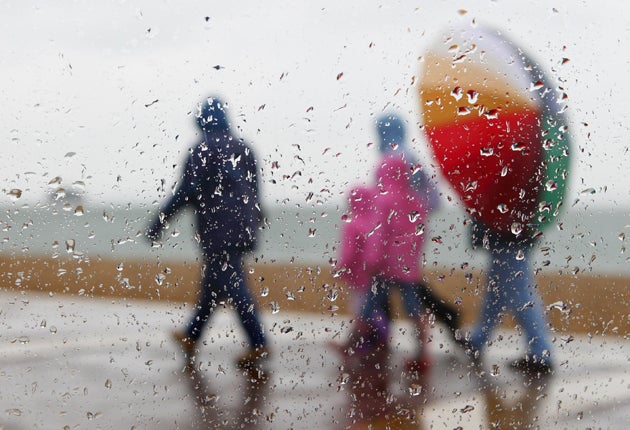The calendar says it's summer – yet it's cold and rainy. Why?
Under the Microscope

Answered by: Sarah Grintzevitch, Royal Meteorological Society
Weather systems and the wind
All our weather in the UK is affected by the wind – the wind brings in our weather systems. And where the wind comes from affects whether it brings warm or cool air.
If it comes from the sea it collects moisture, which will then fall as rain. As you might expect, sea winds are wetter, whereas winds that come across land will be dryer.
At this time of year, we would normally expect a westerly or south-westerly wind, which brings daytime highs of 17C. But we've been having winds from the north, which have brought colder temperatures.
It's not that in the summer we don't get winds from the north, but as summer goes on the sea warms up, which means that the air warms up, making the north winds feel less cold. At the moment, the sun hasn't yet had a chance to warm the North Sea, so the air feels noticeably colder. At this time of year we would expect an average of 13C to 14C – which is being brought down by the wind to about 5C, which feels like a big drop. But in the summer, if it's 20C and a north wind brings it down to 15C, it doesn't feel as extreme.
Another example of wind bringing unusual weather is when it comes from across the Continent. In 2003, when we had a very hot summer, it was because we were getting winds from across Europe which warmed up as they crossed the land.
Air pressure
There are a lot of variants in the weather systems, but the main variant affecting the direction of the wind is air pressure.
Things like the intensity of the sun's radiation, the sea's surface temperature and the density of the air all in turn impact on atmospheric pressure.
And then what type of weather is brought by the different pressures depends on the time of year. At this time of year, and in summer, high pressure is likely to bring warm weather.
But during the winter months high pressure may bring unusually wet, mild weather. And there is what we call the North Atlantic Oscillation (NAO), which is the movement of the sea and atmospheric pressure between the Azores and Iceland.
It's a big factor in our weather in general, governing the air that flows into the UK. One pole of it is the Azores High, a high air-pressure system – a warm area of air – which we would like to have over the summer months to keep us nice and warm. However if we get winds from Iceland and the Arctic in the summer, then it will be cooler, and they also bring moisture so it's likely to be wetter. So a cold, wet summer may be caused by the other pole of the NAO, the Icelandic Low.
El Niño and La Niña
A factor which affects weather around the world is El Niño and La Niña. These are changes in the density of the Pacific Ocean, a change in the flow as it moves across from South America to Asia.
El Niño sees the Pacific warming, while its opposite, La Niña, sees it cooling. The flow of the ocean changes in that specific area in the Pacific, and the ocean very much changes what happens in the air.
So that single thing changes the weather across the world. During the Winter Olympics in Vancouver, they had hardly any snow because of the warming effect – which was unfortunate. Obviously the further away you go, the less effect there is.
Forecasting unseasonable weather
Weather is a bit like the chaos theory. With weather, there are so many small variables that can have an impact, and they can affect us so that we get snow in May, or a nice warm February. That's why forecasting isn't an exact science.
But the weather forecast is now pretty accurate in reporting unseasonable weather. The three-day forecast is now as accurate as the one-day forecast was 10 years ago. So all the cold weather we had before Christmas, and the cold weather over Easter – that was all forecast.
Send your science questions to microscope@independent.co.uk
Join our commenting forum
Join thought-provoking conversations, follow other Independent readers and see their replies
Comments
Bookmark popover
Removed from bookmarks